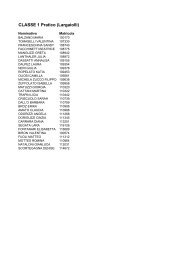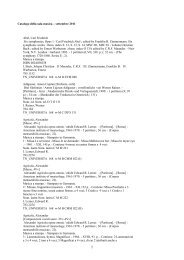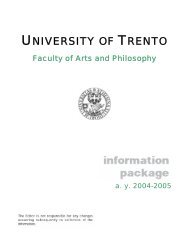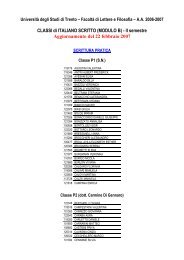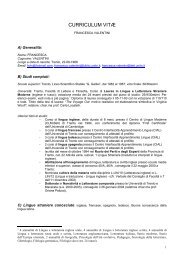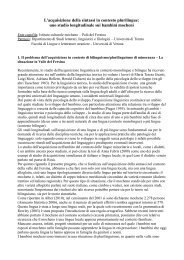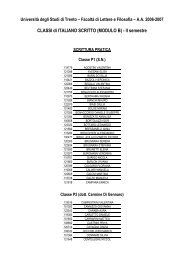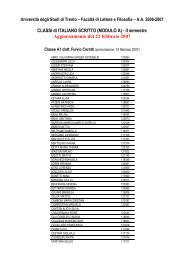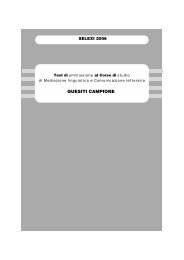PISA Under Examination - Comparative Education Society in ...
PISA Under Examination - Comparative Education Society in ...
PISA Under Examination - Comparative Education Society in ...
You also want an ePaper? Increase the reach of your titles
YUMPU automatically turns print PDFs into web optimized ePapers that Google loves.
M.A. PEREYRA, H. KOTTHOFF AND R. COWEN<br />
another ‘extreme’ case because it focuses on the German <strong>PISA</strong> debate, which is<br />
characterized by terms like ‘<strong>PISA</strong> shock’ and by feel<strong>in</strong>gs of self-doubt. Both<br />
papers try to provide explanations for the specific performance of the two<br />
education systems: Simola and R<strong>in</strong>ne try to expla<strong>in</strong> the ‘F<strong>in</strong>nish miracle’, while<br />
Tröhler tries to expla<strong>in</strong> the ‘German double discontentment’ with <strong>PISA</strong>.<br />
Hannu Simola and Risto R<strong>in</strong>ne start off by suggest<strong>in</strong>g three concepts which they<br />
consider to be promis<strong>in</strong>g theoretical concepts for comparative education. These are:<br />
(1) br<strong>in</strong>g<strong>in</strong>g the theoretical concepts of path dependency, convergence and<br />
cont<strong>in</strong>gency together, (2) trac<strong>in</strong>g the history of the problématique and (3) analys<strong>in</strong>g<br />
national and local <strong>in</strong>terpretations and translations as hybrids. In their follow<strong>in</strong>g<br />
analysis of the ‘F<strong>in</strong>nish <strong>PISA</strong> miracle’ the authors focus exclusively on the concept<br />
of cont<strong>in</strong>gency to see whether the concept can facilitate a broader understand<strong>in</strong>g on<br />
the national phenomenon of ‘F<strong>in</strong>nish <strong>PISA</strong> success’. As a first step Simola & R<strong>in</strong>ne<br />
identify three national ‘truths’ that are widely accepted <strong>in</strong> F<strong>in</strong>land even though there<br />
is, accord<strong>in</strong>g to the authors, not too much empirical research evidence beh<strong>in</strong>d them:<br />
the F<strong>in</strong>ns share a high belief <strong>in</strong> school<strong>in</strong>g, teach<strong>in</strong>g is a very highly regarded<br />
profession <strong>in</strong> F<strong>in</strong>land and the F<strong>in</strong>nish comprehensive school enjoys rather high trust<br />
on the part of both parents, authorities and politicians. In their analysis the authors<br />
illustrate that the genesis of these three national ‘beliefs’ is rather the result of<br />
co<strong>in</strong>cidence and conjunction, than the result of rational and purposeful educational<br />
plann<strong>in</strong>g by educational politicians. In their conclusion, Simola and R<strong>in</strong>ne claim on<br />
the basis of their presented case that conceptualisations such as cont<strong>in</strong>gency must be<br />
taken seriously when pursu<strong>in</strong>g an understand<strong>in</strong>g of national education policies and<br />
politics. The alternative approach, i.e. operat<strong>in</strong>g only through functionalist and<br />
system models, emphasis<strong>in</strong>g ma<strong>in</strong>ly the transnational or national trends or focus<strong>in</strong>g<br />
solely on rational decisions and choices “does not give theoretically adequate<br />
<strong>in</strong>struments for comparative research” (p. 227).<br />
In the second paper Daniel Tröhler analysis the emergence of the lively or even<br />
fierce public and academic discussion on <strong>PISA</strong> <strong>in</strong> Germany, which he expla<strong>in</strong>s as a<br />
clash of two very different cultural self-understand<strong>in</strong>gs. To beg<strong>in</strong> with, Tröhler<br />
clarifies the relationship between three fundamental concepts which lie at the heart<br />
of the debate <strong>in</strong> Germany: competence, Bildung and knowledge. Accord<strong>in</strong>g to<br />
Tröhler’s analysis, the attempt by some German <strong>PISA</strong> experts to mate competence<br />
and Bildung has caused major irritation and raised scepticism <strong>in</strong> Germany. At the<br />
background of this conflict lies, accord<strong>in</strong>g to the author, a ‘clash of cultures’<br />
between American pragmatism on the one hand and the German concept of<br />
Bildung on the other. Bildung resists be<strong>in</strong>g operationalized, is meta-useful and is,<br />
f<strong>in</strong>ally, unmeasurable. In his historical analysis Tröhler po<strong>in</strong>ts out that the roots<br />
of the present <strong>PISA</strong> ideology lie <strong>in</strong> late 1950s, when the Cold War was<br />
‘educationalized’ <strong>in</strong> the USA. The 1950s and 1960s was also the time when the<br />
human capital theory was developed and <strong>in</strong>creased emphasis was put on maths,<br />
science and foreign languages, when cognitive psychology became the ma<strong>in</strong><br />
reference discipl<strong>in</strong>e for education and when the technical systems perspective<br />
became the dom<strong>in</strong>ant perspective <strong>in</strong> education. Compar<strong>in</strong>g these ideological roots<br />
of the <strong>PISA</strong> experts with the German ideology of Bildung expla<strong>in</strong>s, accord<strong>in</strong>g to<br />
12




